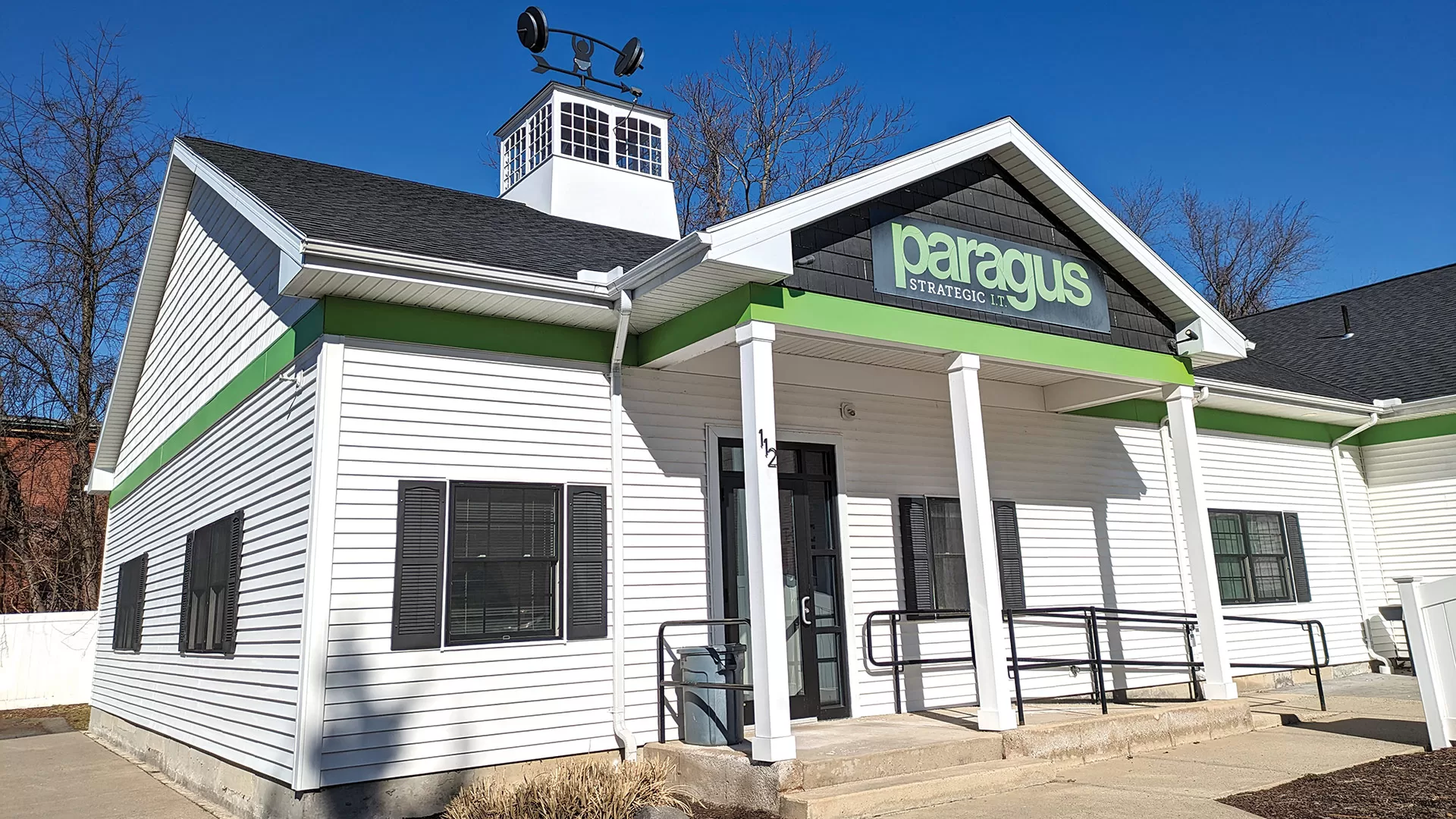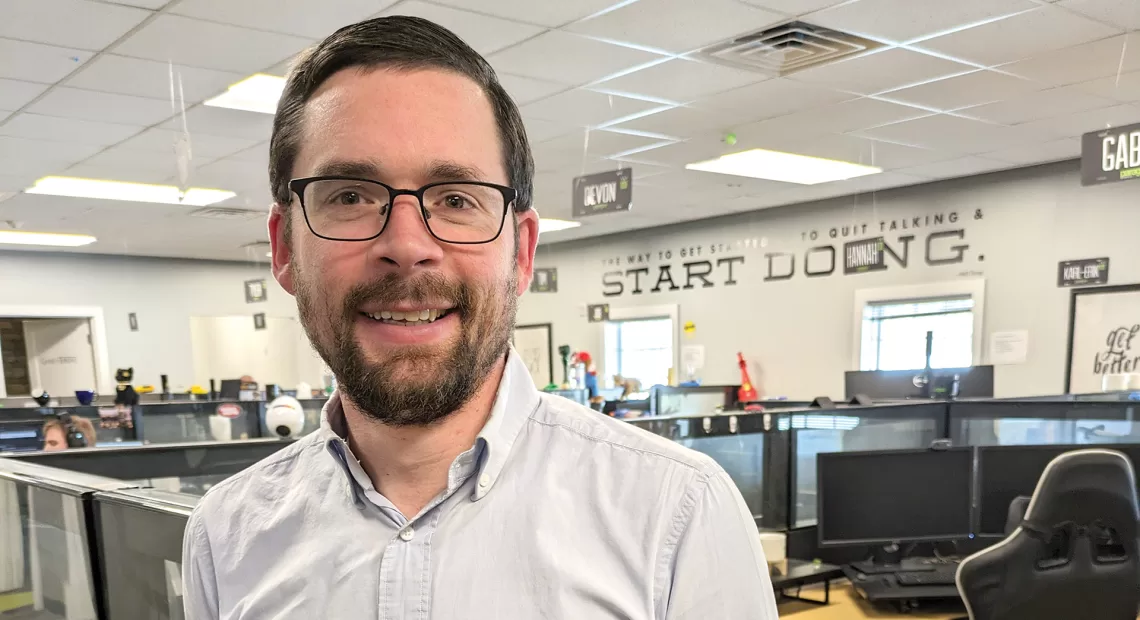CEO, Paragus Strategic I.T.
His Big Goals Promise a Big Impact for Employees, the Region, and Beyond

Delcie Bean had been repairing computers as a side gig from schoolwork from his early teens, and he was a high-school junior when he started taking his enterprise seriously, with business cards and a company name: Vertical Horizons.
The name would change twice over the next two decades, first to Valley Computer Works, then to Paragus Strategic I.T. The technology would change quite a bit, too, as would his business model (more on that later).
What hasn’t changed is Bean’s initial goal: to know more than his clients.
“When I started, it was residential computer support. A lot of it was just helping senior citizens,” he recalled. “I was just helping people who were less sophisticated than I was set up a computer and learn how to use it.
“I didn’t actually know all that much. I just had to know more than the person I was helping,” he continued. “I didn’t have a car; I didn’t have a license. So people had to come pick me up, bring me to their home, and I’d help them fix their computer. I got paid $10 an hour and fed very, very well; it was a lot of grandmas, so I got a lot of cookies and cakes and got invited to a lot of dinners.”
The company grew steadily over the next few years, first in a storefront in Amherst, then in a converted house on Route 9 in Hadley. By 2008 — still only 21 — Bean had accomplished enough to be named to BusinessWest’s 40 Under Forty, one of the youngest-ever honorees. He also earned the publication’s Top Entrepreneur award for 2014 and its first-ever Alumni Achievement Award, given to high-performing 40 Under Forty alumni, in 2015 — both of those recognizing the impressive growth of what was now called Paragus Strategic I.T. and located in a larger building a half-mile east on Russell Street.
“How can we be the sherpas, the guides, for those small businesses and tell them what’s coming around the corner, what they should be thinking about, and what they should be preparing for?”
And now, Bean is a Difference Maker — not necessarily for the company’s still-upward trajectory when it comes to growth and expansion. No, it’s for the impact he’s had on IT workforce development in the region, and also for implementing an ESOP (employee stock ownership plan) model that may create dozens of employee-owner millionaires over time.
“We think we can be a $250 million company in 15 years,” he told BusinessWest. “But in order to do that, we’re going to need to grow a lot, and we’re going to need capital. A lot of businesses in our position bring in a private equity group and leverage their dollars, but that means you work for them, and they make a lot of the big decisions, and it isn’t the same company anymore. And we decidedly did not want to do that.”
He also had no interest in selling the company, feeling he has more to give. “So the third option was to do what we did the first time we wanted to grow, and double down on the ESOP. In this case, we’re becoming 100% employee-owned.”
Keys to Success
Looking back, one of the biggest decisions in Bean’s career took place after he and a partner (whom he eventually bought out) settled on the name Valley Computer Works and bought the house in Hadley.
By 2011, the client base was about 60% residential (with about 4,000 customers) and 40% commercial.
“We got it running like a well-oiled machine. There was a touchscreen kiosk when you dropped it off — you checked off what services you wanted to get. We had it running like a car wash: ‘do you want this package or this package?’ And the whole thing was really efficient, but we weren’t enjoying it. It wasn’t giving me a lot of excitement,” he recalled. “But I loved the commercial stuff. I loved helping companies and working with businesses.”

Besides its Hadley headquarters (pictured), Paragus has a location in Worcester and ambitions to expand its footprint steadily from there.
So, one day, he woke up and decided his future would be in commercial support — and he made the bold decision to shut down 60% of his revenue at the time and build on the 40%.
These days, Paragus exclusively provides IT support to small businesses in an ongoing contract model, he explained. “We are their outsourced IT department, and we become an extension of their company, managing and taking care of whatever they need.”
Bean describes Paragus’ traditional services in terms of three pillars. The first is the help desk. “Your employees have a problem — they can’t turn their computer on, they can’t get into their email, their phone’s not working — and we’re the help desk. We’re the people you call to get those issues taken care of.”
The second pillar is the proactive part of IT: the backups, monitoring, and security. “Obviously, that has evolved and changed so much in the past 10 years, but the core principle is that you need somebody looking after your network and being proactive and taking care of it.”
The third pillar is strategy, helping businesses figure out what technology they should be using, and how to use it more efficiently.
But about four years ago, a fourth pillar emerged at Paragus, which is AI and automation. “That’s all about using technology to make the business more efficient, more intelligent. How do we access more information to run a better business?”
As technology continues to evolve, especially on that fourth front, it’s critical that businesses have a strategic partner well-versed in IT and current trends, he added.
“AI and automation are changing everything. They’re going to have a huge disruption in the labor force in terms of who’s doing what jobs and how those jobs get done. And we’re going to be able to do things that, right now, we can’t do, either because we’re too busy doing the mundane, repetitive work, or because we just didn’t have the tools to be able to work on those things.
“So, how do we stay one or two steps ahead of our customer base,” Bean asked, “but in a way that we can figure out not only how this is impacting our industry, but how it’s impacting small business in general? Then, how can we be the sherpas, the guides, for those small businesses and tell them what’s coming around the corner, what they should be thinking about, and what they should be preparing for?”
Sensing a need for a stronger pipeline of talent into the IT field, in 2014, Bean created Tech Foundry, an educational nonprofit that provides in-depth training for promising individuals, particularly from marginalized or underrepresented backgrounds.
“We wanted to create a program that would take people who are having a hard time finding work, give them a career path, and then we can employ them,” he explained. “It helps us, it helps them, it helps everybody. It seemed very sustainable.”
“About 500 students have graduated from Tech Foundry. And many of them are earning significant salaries, way more than they ever could have imagined.”
Employer partners agreed, and a fundraising campaign brought in $400,000 to launch the program, which continues today — and recently expanded into Tech Hub, a facility in Holyoke where people can learn technology skills to help them advance in an increasingly digital job market.
“About 500 students have graduated from Tech Foundry. And many of them are earning significant salaries, way more than they ever could have imagined,” Bean said. “So it not only impacts that person, it impacts their entire family, because now you’ve just changed this person’s entire trajectory.”
Wealth of Information
In the early years of Vertical Horizon and Valley Computer Works, Bean said, it didn’t matter who owned the company because it wasn’t making any money.
“But there came a time when that changed, and the company was suddenly worth more. And that was the moment where it started to feel a little bit inequitable. We had the same culture; we were all working just as hard. Everybody was the first one in and last one out, and there was no hierarchy; we were all just doing what we could to make this company successful and serve our customers.
“But at the end of the day, as the company actually started to gain value, all that value was coming to me,” he said. “So, around 2013, I had this idea that I wanted to spread that value across the employees. We tried a couple of different models and finally settled on ESOP as the way we wanted to do that.”
The plan was to transfer 40% of the stock to the employees, a transaction that was finalized in June 2016.
“That was the first moment where I actually planned on running the business for many years into the future,” Bean said. “Up until that point, it was still kind of a side project; I was still a kid with no responsibilities. But when I made that decision to become an ESOP, I was like, ‘OK, this is actually a business, and I want this business to grow and thrive and succeed.’”
To do that, he needed to attract top talent who would want to stay, and that meant creating a desirable employee culture — with employee ownership as a key part of that. Which is why Paragus is now expanding its ESOP to become 100% employee-owned.
“I will no longer own any more stock than any of the other employees,” he told BusinessWest. “I’ll just be another employee owner. But we will have created the capital that we need to be able to execute on our acquisition strategy.”
That’s the heart of the plan: to continue to acquire companies in new geographic footprints, a strategy that Paragus piloted in Worcester with its acquisition of Comportz Technologies during the summer of 2021.
“The plan is to try to do an acquisition a year for the next five years or so and continue to learn and grow and figure out what works, what doesn’t work, and then continue to execute that strategy for as long as it provides value to the community, to the customers, and to the employees,” he explained. “Each year, we want to look for a new geographic market that we think has the right conditions for us to succeed and thrive.”
Meanwhile, Paragus continues to give back to the community, supporting many local businesses by donating goods and sponsoring nonprofit events and educational initiatives.
“We’re a company that believes companies can be a force for good in the community and in the world,” Bean said. “For us, the world is too big a target, but the community feels really approachable. We serve businesses in the community, and we’re dependent on the community.”
And now it’s serving those businesses as a 100% employee-owned firm, which promises to change a lot of lives.
“I’d encourage businesses that are looking to grow, looking to transition ownership, looking to make a change, to keep that option on the table without just defaulting to selling out to private equity,” he added. “Oftentimes, the impact of that is losing jobs, losing revenue, and dollars leave the area.”
The opposite is happening at Paragus, which continues to benefit clients, employees, aspiring IT talent, and the community in myriad ways.
That’s the story — with many chapters in his young life still unwritten — of a Difference Maker.

















